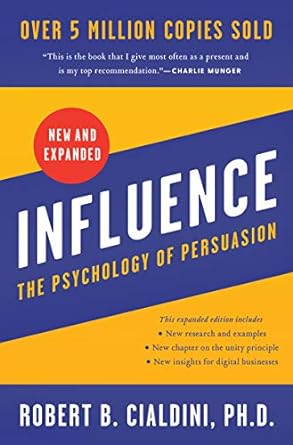Influence: The Psychology of Persuasion” by Robert B. Cialdini is a seminal work in the field of psychology and marketing, offering profound insights into the mechanisms of persuasion that shape our decisions and actions. Here’s a comprehensive review:
The book delves into the psychology behind why people say “yes” and how to apply these understandings in various aspects of life.
Chapters Overview
- Reciprocity: The societal norm that dictates the need to return favors.
- Commitment and Consistency: The desire to align actions with commitments and beliefs.
- Social Proof: The tendency to see an action as more appropriate when others are doing it.
- Authority: The influence of authority figures and the power they wield.
- Liking: The principle that we are more likely to be influenced by people we like.
- Scarcity: The perception of scarcity, leading to increased value and desire.
About the Book
“Influence: The Psychology of Persuasion” is a groundbreaking book that explores the psychology behind why people say yes and how to apply these understandings ethically in everyday life. Robert Cialdini, through extensive research and experiments, has distilled the science of persuasion into six key principles that are easy to understand and apply. The book is not only a tool for marketers or salespeople but also offers valuable insights for anyone looking to understand the dynamics of human behavior or to improve their persuasive skills. Cialdini’s writing is engaging and filled with real-life examples that make the theoretical concepts come to life. Overall, “Influence” is a must-read for anyone interested in the art and science of persuasion.
Key Concepts
1. Reciprocity
The principle of reciprocity is based on the idea that people feel obligated to return favors or gifts. Cialdini illustrates this with the example of the Hare Krishna Society, which increased donations by giving out flowers before asking for contributions. This simple act of giving triggered a sense of obligation among the recipients, leading to higher donation rates.
2. Commitment and Consistency
People have a deep desire to be consistent with their past actions and commitments. Cialdini uses the example of a study where homeowners were more likely to agree to place a large, unsightly sign in their yard if they had previously agreed to a small, inconspicuous sign. This demonstrates how initial, small commitments can lead to larger commitments due to the need for consistency.
3. Social Proof
Social proof refers to the idea that people look to the actions of others to determine their own behavior. Cialdini discusses the phenomenon of “canned laughter” on television shows, which capitalizes on social proof by suggesting that others find the content funny, thereby increasing the likelihood that viewers will laugh.
4. Authority
The principle of authority is based on the notion that people are more likely to comply with requests or follow suggestions from figures of authority. Cialdini highlights the famous Milgram experiment, where participants were willing to administer painful electric shocks to others when instructed by an authority figure, showcasing the powerful influence of perceived authority.
5. Liking
The liking principle suggests that people are more easily persuaded by individuals they like. Cialdini points out factors that increase likability, such as physical attractiveness, similarity, and compliments. He provides the example of Tupperware parties, where sales are driven by the social bonds and likability of the host.
6. Scarcity
Scarcity is the idea that people value things more when they perceive them as rare or in limited supply. Cialdini discusses the use of limited-time offers and exclusive information as tactics that marketers use to create a sense of scarcity, thereby increasing the perceived value of their products or services.

Powerful Quotes
“A well-known principle of human behavior says that when we ask someone to do us a favor we will be more successful if we provide a reason.”
“People seem to be more motivated by the thought of losing something than by the thought of gaining something of equal value.”
“The rule says that we should try to repay, in kind, what another person has provided us.”
“Once we have made a choice or taken a stand, we will encounter personal and interpersonal pressures to behave consistently with that commitment.”
“We view a behavior as more correct in a given situation to the degree that we see others performing it.”
“Often we don’t realize that our attitude toward something has been influenced by the number of times we have been exposed to it in the past.”
“The principle of social proof operates most powerfully when we are observing the behavior of people just like us.”
“The scarcity principle holds that opportunities seem more valuable to us when they are less available.”
“We all fool ourselves from time to time in order to keep our thoughts and beliefs consistent with what we have already done or decided.”
“Commitments are most effective when they are active, public, and effortful.”

About the Author
Robert B. Cialdini is a renowned psychologist and author, known for his expertise in the fields of persuasion, compliance, and negotiation. He is a Professor Emeritus of Psychology and Marketing at Arizona State University and has spent his career researching the science of influence.
Related Books for Further Learning
- “Pre-Suasion: A Revolutionary Way to Influence and Persuade” by Robert Cialdini
- “How to Win Friends and Influence People” by Dale Carnegie
- “Influence: Science and Practice” by Robert Cialdini
- “Yes!: 50 Scientifically Proven Ways to Be Persuasive” by Noah J. Goldstein, Steve J. Martin, and Robert Cialdini
